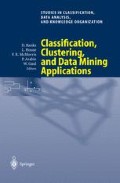Abstract
Dimension reduction techniques based on principal component analysis (PCA) and factor analysis are commonly used in statistical data analysis. The effectiveness of these methods is limited by their global nature. Recent efforts have focused on relaxing global restrictions in order to identify subsets of data that are concentrated on lower dimensional subspaces. In this paper, we propose an adaptive local dimension reduction method, called the Degenerate Expectation-Maximization Algorithm (DEM). This method is based on the finite mixture model. We demonstrate that the DEM yields significantly better results than the local PCA (LPCA) and other related methods in a variety of synthetic and real datasets. The DEM algorithm can be used in various applications ranging from clustering to information retrieval.
Access this chapter
Tax calculation will be finalised at checkout
Purchases are for personal use only
Preview
Unable to display preview. Download preview PDF.
References
Archer, C, and Leen, T. K. (1999). “Optimal Dimension Reduction and Transform Coding with Mixture Principal Components,” International Joint Conference on Neural Networks (IJCNN), IEEE.
Ciuperca, G., Ridolfi, A., and Idier, J. (2003). “Penalized Maximum Likelihood Estimator for Normal Mixtures,” Scandinavian Journal of Statistics, 30, 45–59.
Hastie, T., and Stuetzle, W. (1989). “Principal Curves,” Journal of the American Statistical Association, 84, 502–516.
Hathaway, R. J. (1985). “A Constrained Formulation of Maximum-Likelihood Estimation for Normal Mixture Distributions,” Annals of Statistics, 13, 795–800.
Hinton, G. E., and Ghahramani, Z. (1997). “Generative Models for Discovering Sparse Distributed Representations,” Philosophical Transactions Royal Society B, 352, 1177–1190.
Kambhatla, N., and Leen, T. K. (1997). “Dimension Reduction by Local Principal Component Analysis,” Neural Computation, 9, 1793–1516.
Kiefer, J., and Wolfowitz, J. (1956). “Consistency of the Maximum Likelihood Estimates in the Presence of Infinitely Many Incidental Parameters,” Annals of Mathematical Statistics, 27, 887–906.
Kohonen, T. (1989). Self-Organization and Associative Memory (3rd ed.), Springer-Verlag, Berlin.
Kohonen, T. (1990). “The Self-Organizing Map,” in Proceedings of the IEEE, 78, pp. 1464–1479.
Lin, X. (2003). Finite Mixture Models for Clustering, Dimension Reduction and Privacy Preserving Data Mining, Ph.D. Thesis, Purdue University.
Author information
Authors and Affiliations
Editor information
Editors and Affiliations
Rights and permissions
Copyright information
© 2004 Springer-Verlag Berlin Heidelberg
About this paper
Cite this paper
Lin, X., Zhu, Y. (2004). Degenerate Expectation-Maximization Algorithm for Local Dimension Reduction. In: Banks, D., McMorris, F.R., Arabie, P., Gaul, W. (eds) Classification, Clustering, and Data Mining Applications. Studies in Classification, Data Analysis, and Knowledge Organisation. Springer, Berlin, Heidelberg. https://doi.org/10.1007/978-3-642-17103-1_25
Download citation
DOI: https://doi.org/10.1007/978-3-642-17103-1_25
Publisher Name: Springer, Berlin, Heidelberg
Print ISBN: 978-3-540-22014-5
Online ISBN: 978-3-642-17103-1
eBook Packages: Springer Book Archive

